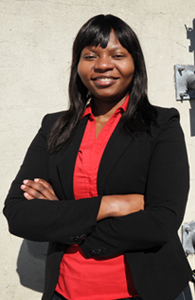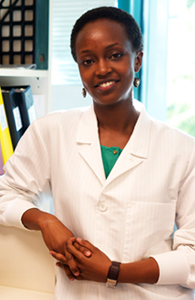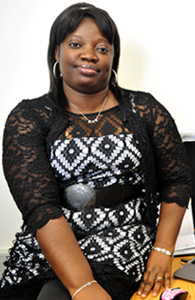L'Oreal UNESCO fellowships for doctoral trio
11 October 2013 | Story by NewsroomA trio of talented young PhD students has won prestigious L'Oreal-UNESCO For Women in Science Sub-Saharan Africa Fellowship Awards to the value of €15 000.
Each has travelled some distance to study at UCT; Joyce Mwangama is from Tanzania, Fiona Baine from Uganda, and Chika Yinka-Banjo from Nigeria.
Mwangama is part of the Centre of Excellence in Broadband Networks and Applications team in the Department of Electrical Engineering. Mwangama's research underpins the evolution of mobile broadband networks, specifically the next generation of mobile networks, and future internet architecture and technologies.
 |
 |
 |
| Joyce Mwangama. (Image by Michael Hammond.) | Fiona Baine. (Image supplied.) | Chika Yinka-Banjo. (Image by Raymond Botha.) |
As the mobile broadband revolution gathers momentum, mobile network operators are struggling to cope with increased traffic volumes. Shared networks are an answer, says Mwangama.
Her research investigates the infrastructure sharing aspect for network operators looking to deploy Evolved Packet System Networks. So although the network is shared, operators are '˜isolated' to ensure security and privacy of information.
Baine has made her home in the Division of Human Genetics in the Department of Clinical Laboratory Sciences and has a special interest in the genetic differences in various population groups and how these relate to the prevalence of Huntington's disease specifically.
Huntington's disease is an inherited disorder that causes the death of a specific population of brain cells, causing movement disorder, behavioural problems and cognitive decline.
"We hope to exploit these genetic differences to develop population-specific gene therapies that selectively target the mutant copy of the Huntington's disease gene in affected individuals," she said.
Baine is also investigating a number of families that show an unusually early onset of disease (referred to as juvenile HD) hoping this will uncover genetic factors that influence the basis of disease occurrence and pathogenesis.
Yinka-Banjo works in the Intelligent Systems & Telecommunications Laboratory in the Department of Computer Science where she's building a behavioural model for a multi-robot system that can be deployed in hazardous environments, such as underground tunnels in mines.
"We built the model by implementing two artificial intelligent algorithms and ultimately hybridised the two algorithms. The aim is to save the lives of miners from mining disasters by doing a pre-entry safety inspection of the mine environment."
Her interest was piqued while studying at the African Institute for Mathematical Science, in Muizenberg. Yinka-Banjo's thesis was on how to detect and avoid obstacles using autonomous robots.
Story by Helen Swingler.
 This work is licensed under a Creative Commons Attribution-NoDerivatives 4.0 International License.
This work is licensed under a Creative Commons Attribution-NoDerivatives 4.0 International License.
Please view the republishing articles page for more information.










